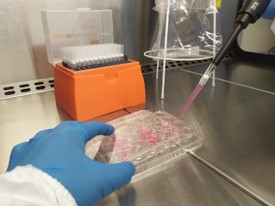AHS serogroup diagnosis: first step

Currently nucleic acid methods have greatly improved the laboratory diagnosis of AHS by increasing the sensitivity of detection and shortening the time required for the diagnosis. In fact, RT-PCR is the election method for the confirmation of clinical cases.
RT-PCR is a highly sensitive technique that provides a rapid identification of AHS viral nucleic acid in blood and other tissues of infected animals. The extraction of nucleic acids from clinical samples can be performed by a variety of in-house and commercially available methods.
Several AHSV gel-based RT-PCR and real-time RT-PCR methods targeted at viral conserved segments have been published. In 2015 the OIE Reference Laboratories for AHS carried out an international ring trial to gather information on the performance of the different methods used in the main AHSV diagnostic laboratories. Ten different RT-PCR protocols were evaluated. In general, very good results were obtained highlighting real time RT-PCR methods of Agüero et al., 2008 y Guthrie et al. 2013. These methods are validated for certification of individual animals prior to movement.
After the first AHS genome detection, it is particularly important to perform virus isolation to dispose of the strain for further studies of characterization.
About serology, at the present, there are no stablished any method to differentiate infected of vaccinated animal (DIVA). Although serological tools can be used to confirmation of clinical case or demonstrate individual animal freedom from infection prior to movement, the main purposes of serological methods are: prevalence of infection studies (including surveillance programs) and post-vaccination assays.
Although methods such as Complement Fixation Test has been used in the past, currently its use is decreasing and ELISA has replaced it in many laboratories because of the higher sensitivity as well as degree of standardization. Blocking and indirect ELISAs are described, but nowadays blocking ELISA are the only format commercially available.
| Serogroup diagnosis methods |
|---|
| AFRICAN HORSE SICKNESS |
|
Sample preparation for virus isolation |